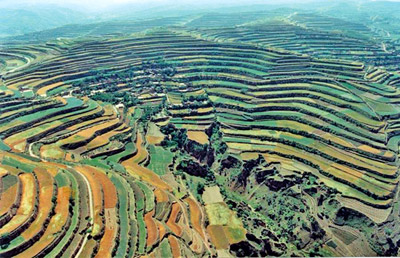For sustainable agriculture
Dr Mae-Wan Ho
There is now widespread recognition that a
rapid shift from industrial agriculture to sustainable farming is needed
to save the climate and guarantee food security for all.
A rapid and significant shift from conventional, industrial,
monoculture towards sustainable production systems is needed, says a new
discussion paper from the United Nations Conference on Trade and
Development (UNCTAD). This follows on the heels of a report by the UN
Special Rapporteur on the Right to Food Olivier de Schutter
demonstrating that agroecology or eco-farming can double food production
in entire regions within 10 years while mitigating climate change and
alleviating rural poverty. These two new papers confirm what we have
found in our comprehensive report released in 2008, which supports our
call for a global shift to non-GM sustainable agriculture in 2003.
Agroecology
De Schutter's report Agroecology and the right to food presented to
the UN Human Rights Council on March 8, 2011 draws extensively on recent
scientific literature to support its conclusions: "Today's scientific
evidence demonstrates that agroecological methods outperform the use of
chemical fertilizers in boosting food production where the hungry live -
especially in unfavourable environments."
 "Agroecology mimics nature, not industrial processes. It replaces the
external inputs like fertiliser with knowledge of how a combination of
plants, trees and animals can enhance productivity of the land," De
Schutter told IPS (Inter Press Service), "Yields went up 214 percent in
44 projects in 20 countries in sub-Saharan Africa using agro-ecological
farming techniques over a period of three to 10 years... far more than
any GM [genetically modified] crop has ever done." Other recent
scientific assessments have shown that small farmers in 57 countries
using agroecological techniques obtained average yield increases of 80
percent. Africans' average increases were 116 percent. "Agroecology mimics nature, not industrial processes. It replaces the
external inputs like fertiliser with knowledge of how a combination of
plants, trees and animals can enhance productivity of the land," De
Schutter told IPS (Inter Press Service), "Yields went up 214 percent in
44 projects in 20 countries in sub-Saharan Africa using agro-ecological
farming techniques over a period of three to 10 years... far more than
any GM [genetically modified] crop has ever done." Other recent
scientific assessments have shown that small farmers in 57 countries
using agroecological techniques obtained average yield increases of 80
percent. Africans' average increases were 116 percent.
Chemical fertilizers not sustainable
De Schutter criticised efforts by governments and major donors such
as the $400 million Alliance for a Green Revolution in Africa (AGRA) to
subsidise fertilizer and hybrid seeds: it produces quick boosts in
yields but are not sustainable in the long term.
Malawi is touted as an AGRA success story by funders such as the
Gates Foundation and the Rockefeller Foundation that have massively
subsidised chemical fertilizers for a corresponding improvement in food
production. But the country cannot afford to continue those subsidies
and is shifting to agroecology. "The [Malawi] government now subsidises
farmers to plant nitrogen-fixing trees in their fields to ensure
sustained growth in maize production," he said.
The dominant view of agriculture is the industrial approach to
maximise efficiency and yield. That approach is utterly dependent on
cheap fossil fuels and never having to be held accountable for
environmental degradation and other impacts. "It is fair to say that
between 45 percent and 50 percent of all human emissions of global
warming gases come from the current form of food production," De Shutter
said.
Greenhouse emissions from industrial agriculture are more than just
carbon dioxide from burning fossil fuels. They include vast amounts of
the super greenhouse gases like methane from intensively raised feedlot
animals, and nitrous oxide from chemical fertiliser. Add deforestation,
mostly done to increase farmland or plantations, and that's around a
third of all emissions. Now, pile on the emissions from food processing
and long distance transport of foods around the world, and it comes
close to half of all human-caused emissions.
The food system doesn't have to be a major source of emissions, the
problem is just the way we have designed it around cheap fossil fuel
energy, De Schutter said. Eco-farming can produce more food for the
world's poorest, while also reducing emissions. It can even store carbon
in the soil.
"We won't solve hunger and stop climate change with industrial
farming on large plantations. The solution lies in supporting
small-scale farmers' knowledge and experimentation, and in raising
incomes of smallholders so as to contribute to rural development." De
Schutter said.
He called on the research community, including centres of the
Consultative Group on International Agricultural Research and the Global
Forum on Agricultural Research to increase the budget for agroecological
research at all levels: from design of sustainable and resilient
agroecological systems in the field, to impacts of various practices on
incomes and livelihoods in farm and communities, and impact on
socio-economic development at national and sub-national levels of
participatory scaling-up strategies and public policies.
Scientists should be trained in the design of agroecological
approaches, including participatory research methods that involve
working with farmers, and ensure that their organisational culture is
supportive of agroecological innovations and participatory research.
Furthermore, projects should be assessed on the basis of a
comprehensive set of performance criteria (impacts on incomes, resource
efficiency, impacts on hunger and malnutrition, empowerment of
beneficiaries,etc.), and not just in terms of classical agronomical
measures.
Shift to sustainable farming
UNCTAD's discussion paper reinforces de Schutter's report. It
emphasizes that climate change could reduce total agricultural
production in many developing countries by up to 50 percent in the next
few decades, in particular in South Asia and sub-Saharan Africa,
simultaneously as the population there is projected to nearly double.
Import is impracticable on account of low purchasing power and expected
food price increases.
 |
|
Shift from conventional, industrial
monoculture towards sustainable production system is needed |
Currently, agriculture's share in global GDP is about 4 percent, but
it contributes to about 13-32 percent of global greenhouse gas (GHG)
emissions, depending on whether direct contribution is counted only or
indirect contributions from land-use changes, land degradation and
deforestation are included.
Thus, GHG emissions from agriculture and forestry are higher than
from the key energy-intensive industrial sectors such as iron and steel,
cement, chemicals or non-ferrous metals, and even surpass those of the
global energy sector.
Under a business-as-usual scenario, agricultural GHG emissions are
predicted to rise almost 40 percent by 2030. Further industrialization
of agricultural production cannot but reinforce this trend, and are
therefore steps in the wrong direction.
Agriculture as sink
If appropriately transformed, agriculture can be turned from being a
climate-change problem to becoming an essential part of its solution. In
fact, many sustainable production practices can be climate neutral or
even become a net carbon sink (as we have previously shown in ISIS'
report). A much more holistic approach is required that not only sees
the farmer as a producer of food and agricultural commodities, but also
as manager of sustainable agroecological systems. The required
transformation is much more profound than simply tweaking the existing
industrial agricultural systems.
The UNCTAD discussion paper called for a transformation from a high
input monoculture to a diverse mosaic of 'regenerative' systems (which
some of us have been referring to as systems based on the 'circular
economy of nature'.
To profoundly transform agriculture towards a mosaic of sustainable
(regenerative) practices takes "bold and visionary policy measures," the
UNCTAD paper said, "governments in developing countries can move ahead
with effective measures at national level if international-level
progress is slow", as "agricultural mitigation and adaptation have low
or negative costs," drawing on local resources, knowledge and skills.
However, a considerable increase of public expenditure for
agriculture is needed, with extension education and services and the
improvement of local infra-structure aimed at empowering in particular
small-scale farmers to significantly increase total productivity of the
new regenerative agricultural systems.
Eco-farming
"The evidence [in favour of sustainable eco-farming] is irrefutable.
If we can change the way we farm and the way we produce and distribute
food, then we have a powerful solution for combating the climate
crisis," said Henk Hobbelink, coordinator of GRAIN to IPS. GRAIN, an
international non-governmental organisation, produced a report in 2009
showing that industrial agriculture was by far the biggest source of
greenhouse gases.
"There are no technical hurdles to achieving these results [of
doubling food production with eco-farming], it is only a matter of
political will," Hobbelink added.
Trade, economic and agricultural policies are all skewed in favour of
the current industrial food production system. And many of those
policies are pushing small farmers - the ones who are by far the most
efficient in terms of carbon emissions and energy use - off the land.
De Schutter said the techniques and benefits of agroecology are now
well established, so his role is to push governments to change policies
and support the transformation of food production.
"Private companies will not invest time and money in practices that
cannot be rewarded by patents and which don't open markets for chemical
products or improved seeds," De Schutter said.
"If we don't radically transform the direction of the global food
system, we will never feed the billion who are hungry...Nor will we be
able to feed ourselves in the future."
- Third World Network Features
|



